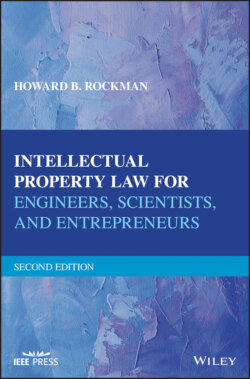Читать книгу Intellectual Property Law for Engineers, Scientists, and Entrepreneurs - Howard B. Rockman - Страница 92
6.3.2 Atlantic Works v. Brady, Supreme Court, 1882
ОглавлениеThe patent in question in this case involved dredge boat construction, the invention consisting mainly of attaching a screw to the forward end of a propeller dredge boat, the boat being provided with tanks for settling it in the water. The dredge is operated by sinking the boat until the screw comes in contact with mud and sand, which, by the rotation of the screw, is thrown up and mingled and carried away with the current. The use of tanks for the purpose of keeping the vessel level while she settled was already old in the art, having been used in dry docks previously. It was also shown that the same tanks for leveling craft were used in many light‐draft monitors during the “late war.” I would like to quote directly from this case to show what the Supreme Court in 1882 felt was the difference between patentable invention and merely the exercise of technical skill:
“The process of development in manufactures creates a constant demand for new appliances, which the skill of ordinary head‐workmen and engineers is generally adequate to devise, and which, indeed, are the natural and proper outgrowth of such development. Each step forward prepares the way for the next, and each is usually taken by spontaneous trials and attempts in a hundred places. To grant to a single party a monopoly of every slight advance made, except where the exercise of invention, somewhat above ordinary mechanical or engineering skill, is distinctly shown, is unjust in principle and injurious in its consequence.”
“The design of the patent laws is to reward those who make some substantial discovery or invention, which adds to our knowledge or makes a step in the useful arts. Such inventors are worthy of all favor. It was never the object of those laws (patent laws) to grant a monopoly for every trifling device, every shadow of a shade of an idea, which would naturally and spontaneously occur to any skilled mechanic or operator in the ordinary progress of manufactures. Such an indiscriminate creation of exclusive privileges tends rather to obstruct than to stimulate invention. It creates a class of speculative schemers who make it their business to watch the advancing wave of improvement, and gather its foam in the form of patented monopolies, which enable them to lay a heavy tax upon the industry of the country, without contributing anything to the real advancement of the arts.”
As you can see, the justices of the Supreme Court sometimes wax poetic when describing their ideas of what should be patentable and what should be not.
